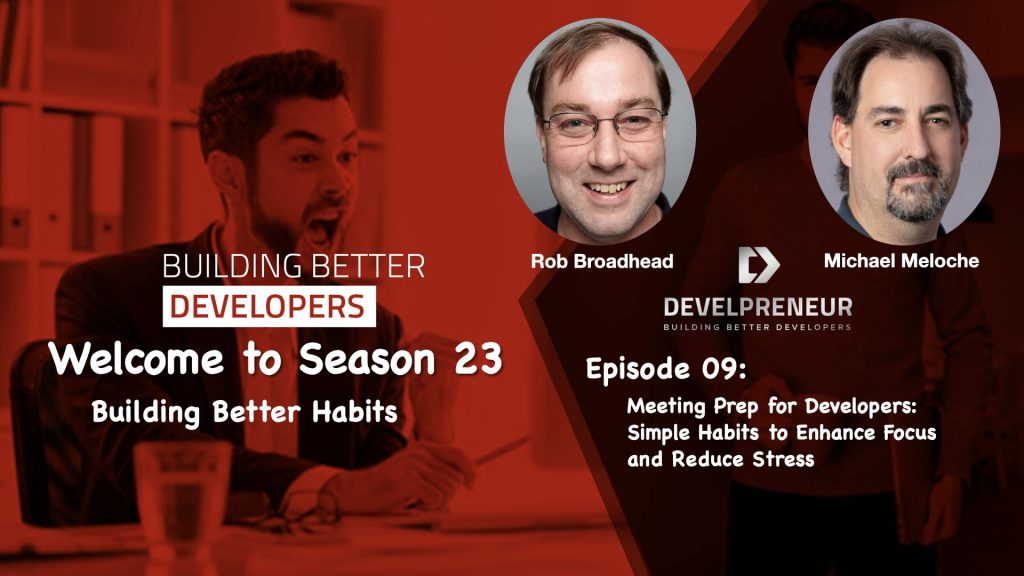Welcome to Episode 9 of the Building Better Developers podcast, Season 23. Hosts Rob Broadhead and Michael Meloche explore the crucial habit of meeting preparation. This season focuses on building better habits as developers. In this episode, they explain how solid meeting prep can streamline projects and reduce stress.
Why Meeting Prep Matters
Rob and Michael start by acknowledging a common challenge in the developer world: meeting frequency and their often chaotic nature. Meetings are an essential part of any team-based workflow. However, when ill-prepared, they can disrupt productivity and lead to a cycle of “meetings about meetings.” Many developers frequently toggle between intense coding sessions and strategic discussions. This constant switch in focus can be exhausting and detrimental to productivity.
In this episode, Rob reflects on his personal experiences with meetings. He admits he hasn’t perfected the art of preparation. However, he has learned several strategies to help minimize wasted time. The episode’s overarching theme is clear: effective meeting prep helps you stay focused and communicate clearly. This preparation ultimately reduces the need for redundant meetings.
Strategies for Effective Meeting Prep
Here are some key strategies Rob and Michael recommend for prepping efficiently before a meeting:
- Plan and Set Goals: Review the agenda for five to ten minutes before each meeting. Set your objectives and identify key talking points. This preparation helps you enter meetings with a clear sense of purpose. If no formal agenda exists, create your outline of expected discussion points. This will help focus your mind and maximize your time.
- Switch Gears Mentally: Developers often face sudden transitions from deep coding to meetings. Rob suggests taking a moment to shift gears mentally before each meeting, especially when switching domains. Step back from technical details and move into “discussion mode.” Focus on meeting goals rather than dwelling on previous tasks.
- Consider the Pomodoro Technique: Rob explains how the Pomodoro Technique helps structure his day, even with just a few intervals. The technique uses regular intervals with built-in breaks. Applying this “Pomodoro mindset” to meeting preparation allows you to maintain better focus throughout the day. This approach helps reduce mental burnout.
- Use a Notebook for Notes: Rob encourages listeners to bring a notebook to every meeting, preferably a physical one. Write down some thoughts before the meeting begins. During discussions, continue taking notes, even if they’re just keywords. This practice reinforces the discussion points and provides a reference for follow-up tasks.
Avoiding Common Meeting Pitfalls
Michael expands on the importance of avoiding pitfalls like “meetings about meetings.” He suggests that poor preparation and inattentiveness can lead to repetitive cycles where meetings fail to accomplish their objectives. To prevent this, Michael recommends these practical tips:
- Eliminate Distractions: Ask everyone to put away their devices and close unrelated tabs. When team members try to multitask, they often miss critical information. This leads to confusion and requires additional meetings to clarify points.
- Turn On the Camera for Virtual Meetings: Using your camera during virtual meetings can significantly boost engagement. When cameras are on, attendees tend to stay more focused. It also makes it easier to notice if someone becomes disengaged or starts multitasking.
- Assign a Note-Taker: Designate someone to take notes during each meeting. This ensures effective information retention and clarity on action items. A meeting summary helps those who couldn’t attend stay informed. It also reduces the need for repeated discussions about the same topics.
- Encourage Timely Wrap-Ups: All meetings should end on time. Schedule a few minutes at the end for questions and follow-up discussion. This practice shows respect for everyone’s time. It also helps maintain energy for the remaining tasks of the day.
Episode Challenge: Pre-Meeting Prep and Note-Taking
Rob issues a “meeting prep challenge” for the week to reinforce these practices. He suggests taking at least five minutes before your next meeting for preparation. Write down the date, primary topic, and any anticipated discussion points. During the meeting, continue taking notes. Once the meeting ends, outline the key takeaways. Even a brief summary will help track action items. This approach makes your meetings feel more organized and intentional.
Why Meeting Prep Is Worth the Effort
Rob and Michael emphasize that meeting prep may take a few extra minutes upfront. However, this investment saves time and reduces redundant discussions. Being mindful of preparation shows respect for everyone’s time. It also helps create a more effective and focused work environment.
Building Better Developers, One Habit at a Time
The episode wraps up with Rob and Michael encouraging listeners to try these strategies. They urge everyone to take their meeting prep to the next level. Building better habits like meeting prep starts with small, intentional actions. These practices enhance both productivity and overall work satisfaction.
Catch the latest episode of Building Better Developers on your favorite podcast platform. Join the hosts as they explore practical ways to streamline meetings and stay focused on what really matters in development.
Stay Connected: Join the Developreneur Community
We invite you to join our community and share your coding journey with us. Whether you’re a seasoned developer or just starting, there’s always room to learn and grow together. Contact us at [email protected] with your questions, feedback, or suggestions for future episodes. Together, let’s continue exploring the exciting world of software development.

